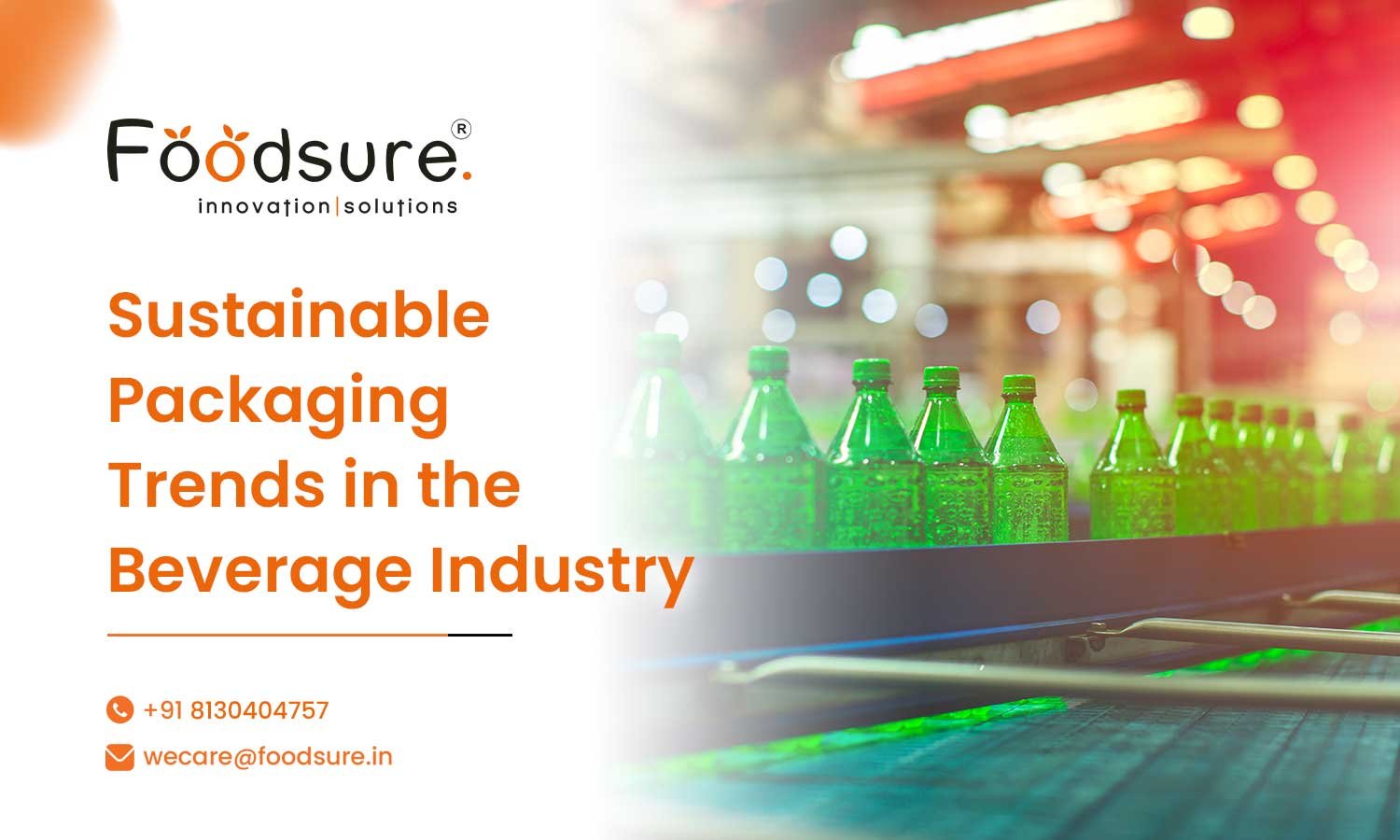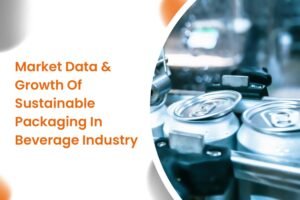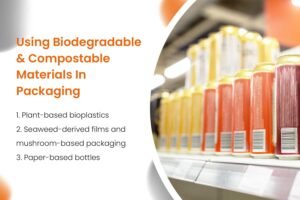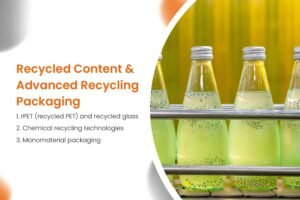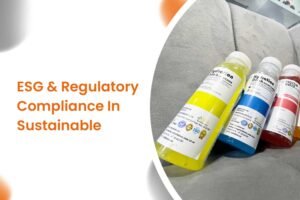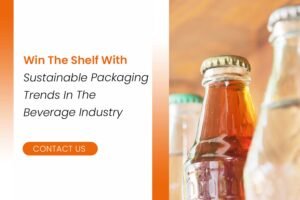The beverage industry is witnessing a major transformation as sustainability has become central to packaging innovations. As the global beverage packaging market is in growth, with an estimated reach of USD 217.54 billion by 2032, with a CAGR of 4.7%, environmentally friendly packaging is most important. Consumers, regulators, and investors are demanding eco-friendly solutions that reduce waste, lower carbon footprints, and support the economy. Sustainable packaging trends in the beverage industry have now become a priority for businesses, which influences the reputation of the brand and helps to meet regulatory compliance and long-term profitability.
Sustainable packaging in beverages includes:
- Use of renewable, recycled, or recyclable materials in beverage packaging.
- Resource use has reduced with the help of lightweight packaging solutions.
- Promotion of reuse, refill, and closed-loop systems in beverage packaging.
- Meet with global regulations and ESG (Environmental, Social, Governance) commitments.
Market Data & Growth Of Sustainable Packaging In Beverage Industry
- Sustainable packaging market:– The sustainable packaging market is estimated to grow from USD 292.71 billion in 2024 to USD 423.56 billion by 2029, with a CAGR of 7.67%.
- Beverage packaging market: The beverage packaging market is expected to rise from USD 144.40 billion in 2023 to USD 217.54 billion by 2032, growing at a CAGR of 4.7%.
- rPET usage: rPET (recycled PET) usage is forecasted to reach 7.5 million metric tons globally by 2027.
- Reusable packaging: Reusable Plastic Containers can be used more than 100 times and can reduce greenhouse gas emissions in the sustainable packaging of beverages.
- Consumer sentiment: According to reports, 70% of consumers prefer beverages in sustainable packaging. (Source)
Now, as we know how important sustainable packaging is and how much it is growing, let’s look at the sustainable packaging trends in the Beverage Industry:
Using Biodegradable & Compostable Materials In Packaging
- Plant-based bioplastics are in more popular, which are used in bottles, caps, and labels, mainly in non-alcoholic beverages. These materials decompose more quickly and reduce landfill burden.
- Seaweed-derived films and mushroom-based packaging are gaining more popularity as alternatives that reduce dependency on fossil fuels and provide viable end-of-life solutions.
- Paper-based bottles use recycled paperboard with thin food-grade liners, which provide a renewable, compostable option of sustainable packaging for spirits and juices.
Recycled Content & Advanced Recycling Packaging
- rPET (recycled PET) and recycled glass have now become more popular in many beverage lines. For example, as per studies, Coca-Cola has committed to using 50% recycled material in its bottles by 2030.
- Chemical recycling technologies break down plastics into reusable units, enabling the use of high-quality recycled content and reducing dependence on virgin materials.
- Monomaterial packaging means using a single type of plastic in the packaging of beverages, which helps to make recycling of materials easier and supports the economy.
Smart & Functional Packaging Of Beverages
- Digital Labels and QR Codes- QR codes, NFC chips, and laser marking help consumers to get information on sourcing, recycling, and authenticity of materials with the help of their phones. This increases transparency and reduces the need for physical inserts in the packaging of beverages.
- Blockchain technology is being used to verify the sustainability of raw materials, which helps to build the trust of consumers.
- Embedded Sensors- Smart caps and labels can monitor freshness, temperature, or tampering, which helps to reduce waste by making sure that the quality of the beverage product is the same throughout the supply chain.
- AI-Driven Packaging- AI sustainable packaging solutions are transforming the beverage packaging designs for durability, shelf life, and environmental impact. This also helps consumers to track easily and helps in the management of inventory in beverage packaging.
Reusable & Refillable Systems For Sustainable Packaging
- Refillable Glass Containers- Brands like ecoSPIRITS and leading spirits companies are using reusable glass containers that help them with large production. The benefit of these containers is that they can be sanitized and refilled.
- Returnable bottle schemes and deposit-return systems are expanding, mainly for water and soft drinks. These models encourage consumers to return packaging for reuse, which reduces single-use plastic and supports a circular economy.
- Circular Economy Initiatives- Many brands are moving toward circular packaging, which keeps materials in use longer, supports refill, and uses recycled content to close the loop.
Paper & Fiber-Based Beverage Packaging
- Paperboard Multipacks- PepsiCo has transformed from plastic rings to paper-based packaging for beverage multipacks in the U.S. and Canada, which helps to reduce plastic waste while maintaining the integrity of the beverage product.
- Fiber-Based Cartons- Tetra Pak and similar companies are innovating with recyclable, renewable fiber-based cartons for juices, milk, and plant-based drinks, which use plant-based or recycled liners.
- Edible and Zero-Waste Packaging- Edible packaging and fully compostable materials are being used to reduce waste completely from beverage packaging streams.
ESG & Regulatory Compliance In Sustainable Packaging
ESG Goals In Sustainable Packaging
Big beverage companies are setting up more targets. As per the recent studies:
- PepsiCo aims for 100% recyclable, compostable, or biodegradable packaging by 2025.
- Coca-Cola targets 25% reusable packaging by 2030.
ESG initiatives now influence everything from raw material sourcing to reducing carbon footprints and ensuring transparency in the supply chain.
Regulatory Compliance In Sustainable Packaging
- The European Union has made it compulsory that all packaging must be reusable or recyclable by 2030, pushing global brands to use sustainable innovation in packaging.
- Asia’s F&B sector is focusing on decarbonization and reduction in waste, with similar regulatory trends emerging worldwide.
Industry Leaders Who Are Using Sustainable Packaging Trends In The Beverage Industry
| Brand | Innovation | Impact |
| PepsiCo | Paperboard multipacks, rPET bottles | Reduced plastic waste, improved recyclability |
| Carlsberg | Plant-based, fiber beer bottles | Lower carbon footprint, renewable materials |
| Coca-Cola | 100% plant-based bottle (pilot), rPET | Renewable packaging, closed-loop recycling |
| ecoSPIRITS | Reusable glass containers for spirits | Eliminated single-use packaging in hospitality |
Consumer Preferences & Business Impact
- Eco-conscious consumers: Nowadays, sustainability has become more important among Gen Z and Millennials. Brands with visible eco-initiatives enjoy more loyalty and willingness to pay a premium.
- Business benefits: Lightweighting and material reduction lower shipping and production costs. Meeting ESG goals improves investor confidence and access to capital.
- Regulatory readiness: Early adoption of sustainable packaging helps brands avoid penalties and adapt smoothly to new laws.
Win The Shelf With Sustainable Packaging Trends In The Beverage Industry
Ready to make your beverage brand impossible to ignore? Sustainable packaging in the beverage industry is your secret weapon. With over 70% of consumers choosing eco-friendly products, brands need to switch to biodegradable, recycled, or reusable packaging that protects the planet. This will help to increase the brand’s appeal and keep you ahead of regulations.
Imagine packaging that tells a story, engages customers with smart features, and reduces waste, all while cutting costs through lightweight design and refillable options. This is your chance to stand out on crowded shelves and win loyal customers who care.
Don’t just follow the trend, lead it with the right sustainability packaging experts. Transform your packaging today and watch your brand grow with the best sustainable packaging trends in the Beverage Industry. Call us on +91 8130404757 to grab your free 20-minute consultation from our beverage product development experts.
Frequently Asked Questions
What are the top sustainable packaging trends in the beverage industry?
Key trends include recycled PET bottles, lightweight glass, aluminum cans, paper-based packaging, refillable systems, and compostable materials designed to reduce environmental impact.
Why is sustainable packaging important for beverage brands?
Sustainable packaging helps reduce carbon footprint, meet regulatory requirements, improve brand image, and align with growing consumer demand for eco-friendly products.
How does recyclable packaging support sustainability goals?
Recyclable materials like rPET, aluminum, and glass reduce reliance on virgin resources and support a circular economy by keeping materials in use longer.
What role do plant-based and biodegradable materials play in beverage packaging?
Plant-based plastics and biodegradable materials lower fossil fuel dependency and are increasingly used for bottles, caps, and labels to reduce environmental impact.
What challenges do brands face when switching to sustainable beverage packaging?
Challenges include higher material costs, limited recycling infrastructure, maintaining shelf life, and ensuring regulatory and food safety compliance.
How do refillable and reusable packaging models benefit beverage companies?
Refillable and reusable systems reduce single-use waste, lower long-term packaging costs, and help build strong sustainability-driven consumer loyalty.
How is technology improving sustainable beverage packaging?
Technologies such as lightweighting, digital watermarks, AI-driven material selection, and lifecycle analysis help optimize packaging sustainability and recyclability.
What are sustainable labeling trends in beverage packaging?
Trends include minimalistic labels, soy-based inks, FSC-certified paper, and QR codes that provide transparency about recycling and sustainability practices.
How does sustainable packaging influence consumer buying decisions?
Consumers increasingly prefer brands with eco-friendly packaging, clear sustainability claims, and visible efforts to reduce environmental impact.
Which sustainability certifications should beverage brands consider for packaging?
Certifications such as FSC, Global Recycled Standard (GRS), ISO 14021, and Cradle to Cradle help validate sustainable packaging claims and build consumer trust.

